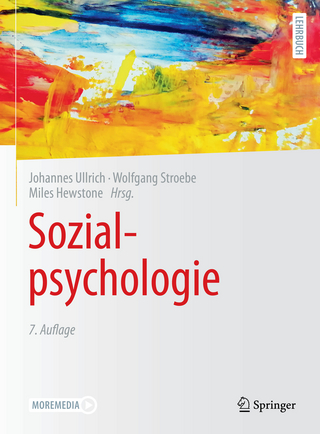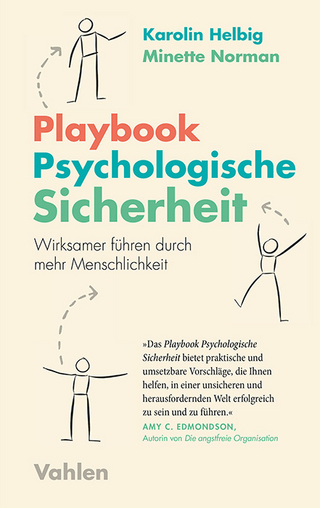
Handbook of Implementation Science for Psychology in Education
Cambridge University Press (Verlag)
978-0-521-12702-8 (ISBN)
Implementation science is the science of the effectiveness of research for real-world practitioners. This book is an indispensable, highly innovative and evidence-based resource aimed at utilizing research in psychology to improve all aspects of education, from individual teaching programs to organizational development. It addresses the widespread confusion and disappointment about the lack of effectiveness of real-world psychology and provides twenty-seven chapters offering proven policies, strategies and approaches for designing, supporting and improving interventions in schools. Collectively, the chapters go beyond the realm of psychology and education, tackling concerns about how to promote positive change in any context, covering topics from epistemology through statistics to examples of implementation approaches, frameworks and protocols. This book creates an immensely relevant body of information and evidence for any practitioner or organization facing the challenges of change. Essential reading for practitioners, policy makers, stakeholders and funders in psychology, education and beyond.
Barbara Kelly, PhD, is a graduate of Edinburgh, Glasgow and Strathclyde Universities. She is currently Associate Tutor to the MSc and Doctoral Programs in Educational Psychology, School of Psychology and Health at the University of Strathclyde, Glasgow. She is also a Senior Educational Psychologist for Glasgow City Psychological Services. A former Research Fellow in the Departments of Education and Social Work at Glasgow University, her work has focused on the effectiveness of interventions and services designed to address children's needs. She has conducted research across a range of contexts, including innovative pre-school education and interventions for child victims of sexual abuse. She has carried out research for the Scottish Government on interventions affecting juvenile offending and on secure provision for juveniles. As both a practitioner and an academic, Dr Kelly offers a unique perspective in exploring and developing innovative frameworks linking theory and epistemology to evidence and practice. Daniel Perkins received his PhD from Michigan State University. He is currently Professor of Family and Youth Resiliency and Policy at Penn State University. His research interests include adolescent and family development; assets, risk and protective factors; collaboration and community development; contextual influences on development; evaluation of prevention and intervention programs; civic engagement in youth; prevention science; risk behaviors and resiliency; theories of adolescence; and youth development. Dr Perkins is currently involved in two major prevention projects. The first involves assessing the effectiveness of a model for the diffusion of empirically-validated prevention programs for adolescent substance abuse and mental health. The project is underway in fourteen communities in Iowa and Pennsylvania. The second study focuses on strategies for strengthening the ability of after-school programs to promote citizenship, skills and positive youth behavior in order to prevent delinquency and substance abuse.
Foreword Robert Slavin; Part I. What is Implementation Science?: 1. Implementation science for psychology in education Barbara Kelly; 2. Implementation science: key concepts, themes and evidence for practitioners in educational psychology Karen Blase, Melissa Van Dyke, Dean L. Fixsen and Frances Wallace Bailey; Part II. Statistical Problems, Approaches and Solutions in Real World Contexts: 3. Developing rigorous programme evaluation Tracey Bywater; 4. Understanding the nature of experiments in real world educational contexts James Boyle; 5. Meta analysis of implementation practice research Carl Dunst and Carol M. Trivette; 6. Using evidence to inform practice in science teaching: the promise, the practice and the potential Judith Bennett; Part III. Preparing for Effective Implementation: Frameworks and Approaches: 7. Implementation science and enhancing delivery and practice in school psychology services: some lessons from the Scottish context Barbara Kelly; 8. The role of executive frameworks in preparing for change in educational contexts Jey Monsen and Lisa Marks Woolfsen; 9. Researching readiness for evidence-based practice: the evidence-based practice attitude scale (EBPAS) Gregory A. Aarons, Amy E. Green and Elizabeth Miller; 10. Change focused organizational consultation in school settings Robert Illback; 11. Implementation of interventions to promote school readiness Janet Welsh; Part IV. Successful Implementation of Specific Programmes and Interventions: Social, Emotional and Behavioural Change, Literacy Development and Leisure Education: 12. Maximizing effectiveness of social-emotional interventions for young children through high quality implementation Celene E. Domitrovich and Mark T. Greenberg; 13. A framework for improving the impact of school-based social competence programmes Keith Topping; 14. Positive behaviour support and young people with autism Glen Dunlap, Philip Strain and Lise Fox; 15. Implementation of a family-centered, school-based intervention to prevent student academic and behavioural problems Elizabeth A. Stormshak, Kathryn Margolis, Cindy Huang and Thomas Dishion; 16. Evidence-based reading interventions: implementation issues for the twenty-first century Robert Savage; 17. Summary of research and implications for practice on reading interventions for young English language learners with reading difficulties Colleen Reutebuch and Sharon Vaughn; 18. Implementing evidence-based leisure education programmes during school Linda Caldwell; Part V. Improving the Implementation of Evidence-Based Programmes and Interventions via Staff Skills, Organisational Approaches and Policy Development: 19. Key classroom features of promoting collaborative dialogue in the classroom Robyn M. Gillies; 20. Practical applications of a 'fidelity of implementation' framework Mollie Rudnick, Cassie Freeman and Jeanne Century; 21. Increasing student voice in school reforms: building partnerships, improving outcomes Dana Mitra; 22. Coaching for instructional improvement and strategies that matter Barbara Neufield and Morgaen Donaldson; 23. The use of evidence-based programs and quality childcare Ann Michelle Daniels; 24. Action research: reshaping practice through assessment and critical reflection Violet Harader and Joyce Yukawa; 25. Measuring child well being in schools: how robust outcome data may inform the selection, design and implementation of evidence-based programmes Tim Hobbs and Tamsin Ford; 26. The common language service development model: from strategy development to implementation of evidence-based practice Nick Axford and Louise Morpeth; Part VI. Signposts towards Effectiveness: 27. Key themes in implementation science for psychology in education Barbara Kelly.
| Erscheint lt. Verlag | 27.3.2014 |
|---|---|
| Zusatzinfo | 32 Tables, unspecified; 26 Line drawings, unspecified |
| Verlagsort | Cambridge |
| Sprache | englisch |
| Maße | 178 x 254 mm |
| Gewicht | 870 g |
| Themenwelt | Geisteswissenschaften ► Psychologie ► Arbeits- und Organisationspsychologie |
| Geisteswissenschaften ► Psychologie ► Pädagogische Psychologie | |
| Sozialwissenschaften ► Pädagogik ► Sozialpädagogik | |
| Sozialwissenschaften ► Soziologie | |
| ISBN-10 | 0-521-12702-5 / 0521127025 |
| ISBN-13 | 978-0-521-12702-8 / 9780521127028 |
| Zustand | Neuware |
| Informationen gemäß Produktsicherheitsverordnung (GPSR) | |
| Haben Sie eine Frage zum Produkt? |
aus dem Bereich


